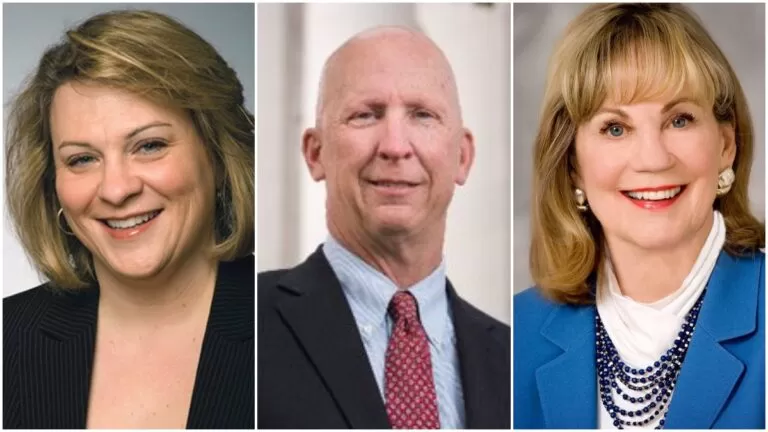UncoverDC previously reported on Wisconsin's audit of the 2020 election, due to release this fall. In the meantime, Wisconsin legislators have introduced numerous bills in the State Senate that would change election law. Senator Duey Strobel, who has introduced most of them, is reported as saying, "We must restore confidence and trust in our elections, and these bills are the first step in doing that."
In the Assembly, Representative Janel Brandtjen is said to be finalizing legislation that aims to restrict influence from outside groups such as the Center for Tech and Civic Life (CTCL), which is funded by Facebook CEO Mark Zuckerberg. She told a local reporter, "You're talking about millions of dollars with no regulations and no reporting... and this is just the money we know about."
 Governor Tony Evers (D- Wisconsin)
Governor Tony Evers (D- Wisconsin)
Among the recent legislation introduced through the Wisconsin State Senate, only SB 208 has made it through and been signed by Governor Tony Evers. It requires the Wisconsin Elections Commission (WEC) to publish meeting minutes. The Governor is not expected to sign the others if they make it to his desk, particularly if they make voting more difficult. Pending bills include those that still await a vote in the Senate and those that have gone to the State Assembly after passage.
The bills still pending Senate Votes are SB 205 and SB 206, which are related to absentee voting in residential care facilities and retirement homes and among the indefinitely confined. Likewise, SB 209 prohibits drop boxes for absentee ballots that are not attached to the municipal clerk's office. It also requires publication of the location and days of availability and that the box is emptied once per day in public view.
SB 211 requires a standard absentee ballot application from the WEC to be created, rather than the current law that allows any written request. Although "certain voters at residential care facilities and qualified retirement homes" are excepted. It also requires the absentee voter to certify facts that establish voting eligibility, including name, date of birth, and street address.
SB 204 is similar to SB 211 but also requires voter ID and mandates that absentee ballots are sent only to those who request them.
SB 214 authorizes absentee ballot canvassers established by the municipality to begin canvassing absentee ballots the day before an election, rather than only the day of. It mandates that counting continue until all absentee ballots are complete. The updated totals of those ballots already canvassed and those remaining to be counted be posted on a website and at the municipal clerk's office at least daily. It establishes tamper-evident seal and double-lock requirements for overnight storage of tabulating equipment, memory devices, and absentee ballots. It also makes willful neglect of legally required election duties by election officials a crime and allows adjacent populations less than 35,000 to enter agreements to share polling places.
 Rep. Janel Brandtjen, Sen. Duey Strobel, R-Saukville, and Sen. Alberta Darling, R-River Hills, are leading the way forward for Election Integrity in Wisconsin.
Rep. Janel Brandtjen, Sen. Duey Strobel, R-Saukville, and Sen. Alberta Darling, R-River Hills, are leading the way forward for Election Integrity in Wisconsin.
Passed by Senate but awaiting consideration by Wisconsin Assembly, SB 203 allows absentee ballot return by for-profit delivery services and to alternate sites and polling places but restricts non-family members from delivering more than one ballot in any election for another voter. It also makes it a felony for a person to obtain an absentee ballot completed by a non-family member for purposes of delivering it for them. However, non-family members are still allowed to deliver a single ballot when designated to do so in writing by a voter otherwise unable to deliver it themselves.
SB 213 is also pending Assembly vote and would allow courts to address election complaints directly rather than routing complainants first through the WEC.
SB 207 ostensibly restricts outside influence on election administration, restricting application or acceptance of any donation or grant for election administration equipment, materials, or personnel from a nongovernmental entity, "except as expressly authorized under the statutes relating to elections."
SB 210 requires the municipal clerk, chief inspector, and board of canvassers to provide election observers "uniform and nondiscriminatory access to all stages of the election process, including recounts." It requires observers to wear their name on a badge along with the name of any applicable organization and prohibits them from wearing campaign or ballot advocacy material. They also may not interfere with a voter nor hinder an election official's performance of duties.
SB 212 prohibits election officials from intentionally assisting knowingly invalid votes to be counted or knowingly valid votes to go uncounted, and the same for voter registrations. It makes a crime of failing to promptly report election fraud committed by another election official.
The WEC will be meeting Wednesday, June 2 at 9 A.M. to discuss recently released reports about voter fraud. One report details almost 300 cases of voter fraud since 2016, including 41 referred to county district attorneys for criminal action, 13 of which are specific to the November 2020 election. Another deals with cross-state voting and the information the WEC will receive later this year from the Electronic Registration Information Center (ERIC) about potential matches of Wisconsin voters with voters in other states. A third report regards "election reconciliation," wherein election information is studied for variance or inaccuracies by analyzing data such as poll books, inspector statements, and vote counts. The meeting is public and may be attended by telephone or Zoom. Brief public comments at the start of the meeting require pre-sign-up by email.
Supporters for Wisconsin Voter Alliance (WVA) and its attorney Erick Kaardal, who has filed court cases against five of the largest cities in Wisconsin, met at the capitol for a rally last week against CTCL and similar 3rd party organizations. In an email from WVA, President Ron Heuer wrote, "During the November election cycle, there were a number of public/private organizations embedded in local communities working to influence the vote. We all know of CTCL, and National Get Out the Vote Institute, but there were others like Voices de la Frontera and Rock the Vote," and requested that any information recipients have about these, 501(c), Get Out the Vote, or voter training organizations, be sent by email.
Mike Lindell is hosting a Maga Frank Rally on Saturday, June 12, from 11:30 AM - 4 PM in New Richmond, WI. President Trump will appear remotely, and speakers include Diamond & Silk, Danielle D'Souza, Dinesh D'Souza, Charlie Kirk, Sheriff Clarke, Chris Cox, and Brandon Howse.



